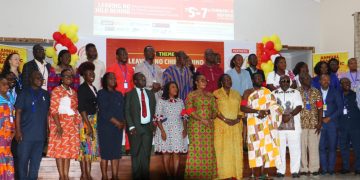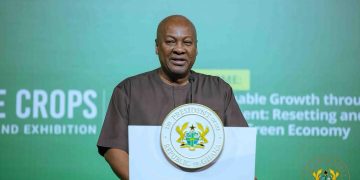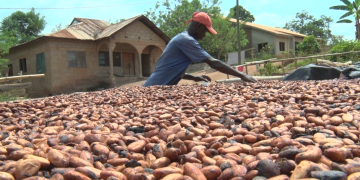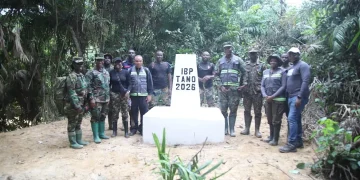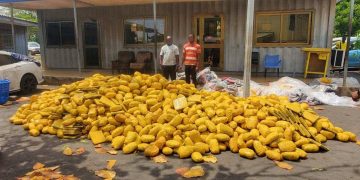The Government of Ghana, in partnership with the United Nations Human Settlements Programme (UN-Habitat), has joined the global community to commemorate this year’s World Habitat Day under the global theme “Urban Crisis Response” and the localized theme “Resilient Cities, Inclusive and Clean Communities: Responding to Urban Challenges.”
The observance, jointly organized by the Ministry of Local Government, Chieftaincy and Religious Affairs (MLGCRA), the Ministry of Works, Housing and Water Resources (MWHWR), and UN-Habitat Ghana, calls for bold and coordinated efforts to tackle the growing challenges of urbanisation, climate change, housing deficits, and environmental degradation.
Transforming Urban Development
The Ministry of Local Government, Chieftaincy and Religious Affairs highlighted ongoing initiatives aimed at promoting sustainable and inclusive cities across Ghana.
Central to these efforts is the Sustainable Cities Strategy, launched earlier this year with World Bank support, which provides a comprehensive framework for integrated urban planning, digital innovation, and participatory governance.
The Ministry has also revived the National Sanitation Day campaign to encourage civic participation in maintaining clean urban environments, reducing flood risks, and promoting environmental health.
Additionally, the government is finalising two key policy documents the National Urban Policy (2026–2035) and the National Slum Upgrading and Prevention Strategy (2025–2034) to guide equitable and resilient urban growth.
These frameworks, supported by UN-Habitat and the European Union, seek to improve living conditions in informal settlements through enhanced tenure security, infrastructure upgrades, and community-led interventions.
These initiatives complement the ongoing Greater Accra Resilient and Integrated Development (GARID) Project, which focuses on slum upgrading, flood mitigation, and improved waste management in vulnerable communities.
Bridging Ghana’s Housing and Infrastructure Gap
The Ministry of Works, Housing and Water Resources reaffirmed its commitment to addressing Ghana’s housing deficit through sustainable and inclusive infrastructure development. With technical support from UN-Habitat and the United Nations Office for Project Services (UNOPS), the Ministry has completed a review of the Ghana Housing Profile (2024), providing practical recommendations for improving housing accessibility and affordability.
Among key housing projects highlighted were the Pokuase-Afiaman Affordable Housing Project, targeting 8,000 housing units for low- to middle-income earners through a Public-Private Partnership (PPP) model, and the Greenville District Housing Programme, which will deliver 328 EDGE-certified housing units across eight pilot districts.
Through the National Homeownership Fund (NHF) and the National Rental Assistance Scheme, the government has expanded access to homeownership and rent support, disbursing over GH₵33 million to assist nearly 4,000 Ghanaians.
Additionally, 1,000 new housing units have been completed under the Security Services Housing Programme.
Decarbonising the Built Environment
UN-Habitat has also supported Ghana in developing a Climate Action Roadmap for the built environment. The roadmap provides a blueprint for adopting sustainable local building materials and advancing low-carbon, climate-resilient construction practices. Capacity-building efforts are underway to equip local industry stakeholders with the necessary skills for green construction.
Accelerating SDG Achievement and Building Coastal Resilience
Under the Smart SDG Cities Programme, UN-Habitat is supporting 10 cities across eight regions to strengthen urban governance, enhance planning systems, and accelerate progress towards the Sustainable Development Goals (SDGs) through data-driven, people-centred development.
In addition, the Improved Resilience of Coastal Communities in Côte d’Ivoire and Ghana Project, launched in 2024 with funding from the Adaptation Fund, is helping coastal districts such as Ada West, Ada East, and Anloga build resilience through nature-based solutions, ecosystem restoration, and community-driven climate adaptation measures.
Shared Commitment to Inclusive Urban Futures
In a joint statement, Ahmed Ibrahim (MP), Minister for Local Government, Chieftaincy and Religious Affairs; Kenneth Gilbert Adjei, Minister for Works, Housing and Water Resources; and Ms. Abena Ntori, Country Manager of UN-Habitat Ghana, reaffirmed their collective commitment to building resilient, inclusive, and sustainable urban communities.
“As we mark World Habitat Day 2025, we call on all stakeholders government agencies, traditional authorities, civil society, the private sector, and urban residents to join hands in shaping urban futures that leave no one behind,” the statement read.
Source: www.kumasimail.com








